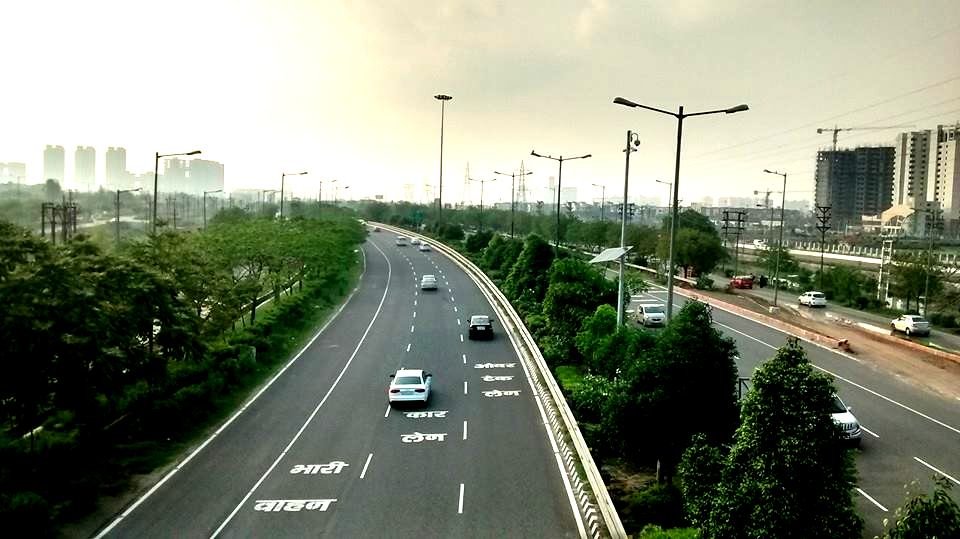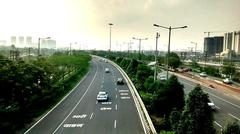
Comprehensive Guide to Visiting Noida–Greater Noida Expressway, Ghaziabad, India
Date: 17/08/2024
Introduction
The Noida-Greater Noida Expressway is a pivotal infrastructure project within India’s National Capital Region (NCR), connecting Noida to Greater Noida over a span of approximately 24.53 kilometers. Conceptualized to alleviate traffic congestion on the old Delhi-Agra national highway (NH-2), the expressway was constructed at a cost of ₹400 Crore. Its primary goal was to provide a faster, more efficient route for commuters and to stimulate economic growth in the region (Wikipedia).
Beyond its role as a transportation corridor, the Noida-Greater Noida Expressway has significantly impacted the regional economy, driving the development of IT and software parks and transforming the area into a key IT hub. This, in turn, has spurred substantial growth in the real estate sector, attracting both multinational corporations and individual investors (Medium).
Strategically important, the expressway is currently under expansion to link with the Taj Economic Zone, the proposed International Airport, and the Aviation Hub along the Yamuna Expressway. Future developments, including the proposed Jewar International Airport and the Noida Metro Aqua Line, promise to further enhance connectivity and economic prospects (Wikipedia, Medium).
This comprehensive guide delves into the history, significance, and future prospects of the Noida-Greater Noida Expressway. It also provides essential travel tips, highlights nearby attractions, and offers insights into the booming real estate market along the expressway.
Table of Contents
History and Significance of the Noida-Greater Noida Expressway
Early Conceptualization and Construction
The Noida-Greater Noida Expressway, a pivotal infrastructure project in the National Capital Region (NCR) of India, was conceptualized to address the burgeoning traffic congestion on the old Delhi-Agra national highway (NH-2). The expressway spans 24.53 kilometers (15.24 miles) and was constructed at a cost of ₹400 Crore. It was designed to connect Noida, an industrial suburb of Delhi, to Greater Noida, a newly developed suburb. The primary aim was to provide a faster, more efficient route for commuters and to stimulate economic growth in the region (Wikipedia).
Strategic Importance and Expansion Plans
The strategic importance of the Noida-Greater Noida Expressway is underscored by its role in connecting major economic zones. It is currently under expansion to link with the Taj Economic Zone, the proposed International Airport, and the Aviation Hub along the Yamuna Expressway (Taj Expressway). This expansion is expected to further enhance the region’s connectivity and economic prospects (Wikipedia).
Economic Impact
The expressway has been a catalyst for economic growth in the region. Its enhanced connectivity has attracted numerous multinational companies and industries, creating a thriving business environment. The development of IT and software parks along the expressway has transformed it into a key IT hub in the NCR region. This has spurred the development of commercial real estate, with numerous IT parks, business centers, and shopping malls emerging along the route (Medium).
Real Estate Boom
One of the most significant impacts of the Noida-Greater Noida Expressway has been on the real estate sector. The area around the expressway has seen a surge in residential and commercial developments, attracting both investors and homebuyers. Renowned developers like ACE Group, ATS, Jaypee Greens, and Supertech have established their presence here, offering state-of-the-art amenities and world-class living standards (Medium).
Design and Construction Standards
The expressways in India, including the Noida-Greater Noida Expressway, follow standards set by the Indian Roads Congress and the Bureau of Indian Standards. The National Highways Authority of India, operating under the Ministry of Road Transport and Highways, is responsible for the construction and maintenance of these expressways. The Noida-Greater Noida Expressway was designed to avoid inhabited areas and go through new alignments to reduce land acquisition costs and construction timelines (Wikipedia).
Challenges and Ongoing Developments
Despite its success, the Noida-Greater Noida Expressway has faced several challenges. The construction of flyovers over the expressway is still ongoing, and land disputes have plagued the Faridabad-Noida-Ghaziabad (FNG) Expressway project, which intersects with the Noida-Greater Noida Expressway. These issues have caused delays and have been a source of frustration for commuters and residents alike (India Today).
Future Prospects
The future of the Noida-Greater Noida Expressway looks promising, with several planned developments set to further enhance its appeal. The proposed Jewar International Airport, expected to be operational by 2024, is poised to be a game-changer, driving up real estate demand and boosting economic activity. Additionally, the upcoming Noida Metro Aqua Line, which runs parallel to the expressway, will further boost connectivity, making daily commutes hassle-free for residents and professionals (Medium).
Inter-Connectivity with Other Major Projects
The Noida-Greater Noida Expressway is part of a larger network of expressways and highways designed to improve connectivity in the NCR. The Faridabad-Noida-Ghaziabad (FNG) Expressway, a 56-kilometer long, six-lane highway, is another significant project aimed at decongesting major arterial roads in Delhi. Although the FNG Expressway has faced numerous delays, it is expected to provide a vital link between Faridabad, Noida, and Ghaziabad once completed (Wikipedia).
Visitor Information
Travel Tips
Travelers should be aware of peak traffic times to avoid delays. Using navigation apps can help find the best routes and avoid congestion. Additionally, it’s recommended to ensure your vehicle is well-maintained for a smooth trip along the expressway (Medium).
Visiting Hours and Tickets
The Noida-Greater Noida Expressway is open 24/7, providing round-the-clock connectivity for travelers. There are no specific visiting hours or ticket requirements to travel on the expressway, making it accessible at any time for commuters and visitors.
Nearby Attractions
The Noida-Greater Noida Expressway passes through major cities such as Palwal, Faridabad, and Ballabhgarh. Some important landmarks along the expressway include the India Expo Mart, Buddh International Circuit, and Noida Golf Course (India.com).
Real Estate Market
Property Market Appeal
The Noida-Greater Noida Expressway has benefited from an increase in housing values, providing consumers with a variety of alternatives. The purchase price of houses in this area has climbed by an average of more than 10% every year, with Sectors 93B, 107, and 108 seeing roughly 40%, 30%, and 25% YoY increases, respectively. The location has also produced favorable Returns on Investment (ROI), with over 15 sectors surrounding the motorway producing a reasonable yearly rental yield. Sectors 99 and 168 provided around a 10% yearly rental income, while Sector 107 supplied about a 5% yield year on year (PropertyPistol).
Real Estate Alternatives
End-users looking to invest in areas near the Noida-Greater Noida Expressway have a variety of alternatives, including flats and independent houses in both ready-to-move and under-construction stages. Approximately 75% of the residential stock across property types is ready, with the remainder under construction (PropertyPistol).
Low-Cost Homes
The residential properties along the Noida-Greater Noida Expressway are predominantly in the mid-segment, with fewer than 5% of affordable housing inventory available. Residential plots, 1 BHK, and 2 BHK apartments are the most affordable properties. Apartments cost between Rs 6,000 and 20,000 per square foot, while plots cost between Rs 11,000 and 14,000 per square foot. Builders offering affordable projects in the area include ATS Infrastructure Limited, Gulshan Homz Builders and Developers, and Omaxe Limited (PropertyPistol).
FAQ
What are the visiting hours for the Noida-Greater Noida Expressway?
The expressway is open 24/7, providing round-the-clock connectivity for travelers.
Are there any tickets required to use the expressway?
No, there are no specific ticket requirements to travel on the Noida-Greater Noida Expressway.
What are some key attractions along the expressway?
Important landmarks include the India Expo Mart, Buddh International Circuit, and Noida Golf Course.
What is the economic impact of the expressway?
The expressway has significantly boosted economic growth by attracting multinational companies and industries, leading to a thriving business environment and the development of IT and software parks.
How has the expressway affected the real estate market?
The area around the expressway has seen a surge in residential and commercial developments, with housing values increasing by an average of more than 10% every year.
Conclusion
The Noida-Greater Noida Expressway stands as a testament to modern infrastructure development in India, significantly impacting the region’s connectivity, economic growth, and real estate market. Its ongoing and future projects promise to further enhance its significance, making it a vital artery in the NCR’s transportation network. For more detailed information and updates, consider downloading the mobile app Audiala or following our social media channels.
